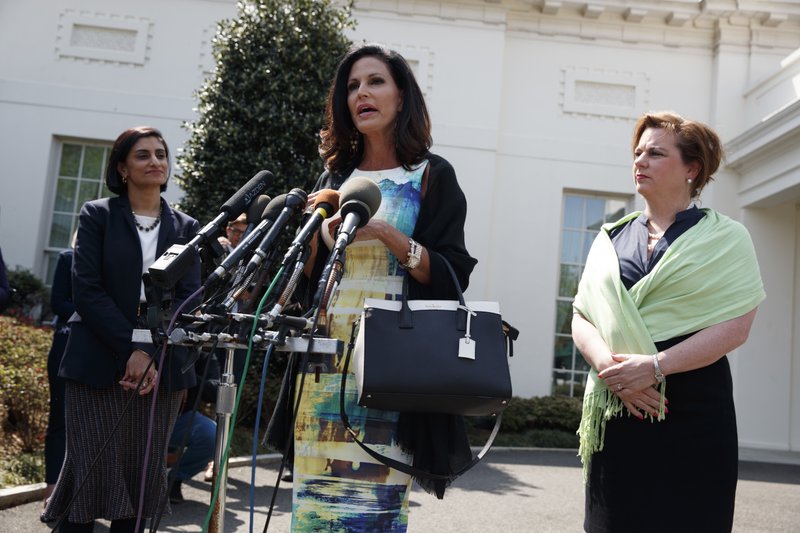WASHINGTON -- President Donald Trump signed legislation Thursday that lets states deny federal family-planning money to Planned Parenthood and other abortion providers.
Trump's action erases a rule, finalized shortly before President Barack Obama left office in January, that said states could not block the money.
The move marks the 12th time that Trump has signed a resolution under the 1996 Congressional Review Act, abolishing a rule issued under Obama.
The ceremony was closed to the media. The ceremony was attended by Seema Verma, director of the Centers for Medicare and Medicaid Services, as well as abortion opponents such as the leaders of the Susan B. Anthony List and Concerned Women for America.
[PRESIDENT TRUMP: Timeline, appointments, executive orders + guide to actions in first 100 days]
Trump did not issue a statement Thursday, though the White House announced that he had signed the bill.
Verma said after Trump signed the bill in the Oval Office that the administration wants states to decide what's best for them and the people they serve.
House Speaker Paul Ryan, R-Wis., called the measure "a major pro-life victory."
"Taxpayers should not be forced to fund abortion, plain and simple," Ryan said in a statement. "We remain united and steadfast in our commitment to life and religious liberty."
Undoing the prohibition also gives Republicans and anti-abortion groups a victory after House Republicans failed to agree last month on a bill they had sought for years to overhaul the health care system. The failed House bill, which Trump supported, would have blocked federal money for Planned Parenthood for a year, in addition to repealing parts of the 2010 Paient Protection and Affordable Care Act.
Federal law already prohibits government money for abortion, except in cases of rape or incest or to save a woman's life.
The rule tossed out by Trump required state and local governments to distribute federal dollars for family-planning services, including contraception, sexually transmitted diseases, fertility, pregnancy care, and breast and cervical cancer screening, to qualified health providers, irrespective of whether the providers also performed abortions.
Republicans and abortion opponents said the new law will let states divert money now going to groups that perform abortions to organizations that do not.
Democrats and abortion-rights advocates said it represented an attack on women.
Marjorie Dannenfelser, president of the anti-abortion group Susan B. Anthony List, said the change will lead to better care for women and girls. She said the law "simply ensures that states are not forced to fund an abortion business with taxpayer dollars." She said states will now have the option to spend federal family-planning funds on comprehensive health care clinics.
Stephanie Schriock, president of Emily's List, which supports Democratic female candidates for public office who support abortion, said the bill is another example of politicians chipping away at women's rights and making it harder for the less fortunate to get health care.
"We won't stand for it," Schriock said.
Dawn Laguens, executive vice president of the Planned Parenthood Federation of America, said the administration should build on the progress that's been made "instead of enacting policies that take us backward."
"People are sick and tired of politicians making it even harder for them to access health care, and this bill is just the latest example," she said. "Too many women still face barriers to health care, especially young women, women of color, those who live in rural areas, and women with low incomes."
Heidi Williamson, the senior policy analyst for the Women's Health and Rights Program at the Center for American Progress, said: "Despite repeated promises that he would protect and invest in women's health, President Trump has once again shown that his words carry little weight. Trump's actions are creating very real and damaging consequences for millions of women and their families, inflicting direct harm on already-vulnerable communities."
The measure narrowly cleared the Senate in late March after Sen. Johnny Isakson, R-Ga., who had been absent while recovering from spinal surgery, returned to Washington to vote, bringing the tally to 50-50 in the 100-member chamber.
Vice President Mike Pence, in his constitutional role as president of the Senate, cast the tiebreaking vote.
Obama's administration initially crafted the rule in response to moves by more than a dozen Republican-controlled states in recent years to defund Planned Parenthood and other abortion providers. They did so by blocking clinics from receiving Title X money -- named for the 1970 law that created the federal family-planning program -- as well as Medicaid reimbursements.
State courts have ruled against such restrictions for Medicaid reimbursements, but since Title X money is distributed through grants to states, they have the power to set criteria for recipients.
Republicans in Congress and legislatures around the country have targeted Planned Parenthood because its network is the largest provider of abortions, although about half of its affiliates do not perform them.
Information for this article was contributed by Darlene Superville of The Associated Press; by Juliet Eilperin of The Washington Post; and by Julie Hirschfeld Davis of The New York Times.
A Section on 04/14/2017
